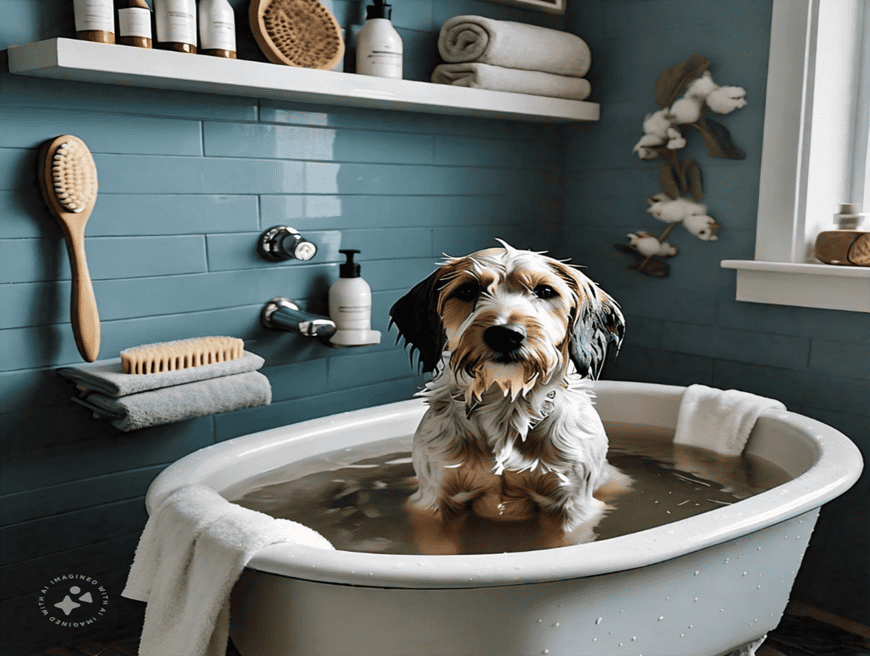Epsom salt baths have long been a popular home remedy for humans, offering benefits such as muscle relaxation, pain relief, and skin soothing effects. But did you know that Epsom salts can also be beneficial for your furry friends? Just as they help humans, Epsom salt baths can provide relief to dogs dealing with various ailments, from skin irritations to muscle pain.
In this blog post, we’ll explore the potential benefits of Epsom salt baths for dogs, safety precautions to consider, step-by-step instructions for giving your dog a bath, and alternative treatments. Whether you’re a new dog owner or an experienced pet parent, this guide will help you make informed decisions about incorporating Epsom salt baths into your dog’s care routine.
Epsom salt, also known as magnesium sulfate, is a naturally occurring mineral compound composed of magnesium, sulfur, and oxygen. It is named after a saline spring in Epsom, England, where the salt was first discovered. Unlike table salt, Epsom salt is not for culinary use but is widely recognized for its medicinal and therapeutic properties.
For humans, Epsom salt is commonly used in baths to soothe sore muscles, reduce inflammation, and detoxify the body. It works by breaking down into magnesium and sulfate when dissolved in water, which can be absorbed through the skin. Magnesium plays a crucial role in muscle and nerve function, while sulfate aids in flushing toxins and improving nutrient absorption.
Understanding how Epsom salt works for humans helps us explore its potential benefits for our canine companions.
Epsom salt baths are not just for humans; they can be a great addition to a dog’s wellness routine, especially for specific conditions. Here are some of the potential benefits for dogs:
While there is ample anecdotal evidence from pet owners who swear by Epsom salt baths, it is always best to consult with a veterinarian to ensure it is appropriate for your dog’s specific condition.

Before starting any new treatment, it’s crucial to consider safety, especially when it involves our furry friends. Here are some safety precautions to keep in mind when using Epsom salt baths for dogs:
Always consult your veterinarian before giving your dog an Epsom salt bath, particularly if your dog has underlying health issues or is on medication. Your vet can advise on whether an Epsom salt bath is suitable and recommend a safe concentration.
Some dogs may have allergies or sensitivities to magnesium sulfate. Before a full bath, test a small amount of the solution on a patch of your dog’s skin. If there is no reaction after 24 hours, it should be safe to proceed.
Dogs are known to drink bathwater, but ingestion of Epsom salts can lead to serious digestive upset, including diarrhea, vomiting, and even toxicity. Always ensure your dog does not drink the water during the bath. If accidental ingestion occurs, consult your vet immediately.
Use a proper concentration of Epsom salt to water ratio (generally, one cup of Epsom salt per gallon of warm water is safe). Ensure the water temperature is lukewarm—not too hot or cold—to avoid causing discomfort or burns.
Epsom salt baths should generally last no longer than 10–15 minutes and should not be given more than twice a week unless advised otherwise by a vet. Overuse can lead to dryness or skin irritation.
Puppies, older dogs, and dogs with specific health issues may have more sensitive skin or may react differently to Epsom salt baths. Extra caution should be exercised, and always follow your vet’s recommendations.
Abiding by these precautions can help ensure a safe and beneficial experience for your dog.
Giving your dog an Epsom salt bath is a straightforward process, but it does require some preparation and care. Here’s a step-by-step guide:
If your dog resists or is afraid of baths, try using a smaller tub or even a large bucket outside (weather permitting) to create a more relaxed environment. Some dogs feel less threatened in a smaller space or familiar outdoor setting.

If your dog does not respond well to Epsom salt baths or you prefer alternative treatments, there are other options available that can offer similar benefits:
Each alternative comes with its own set of pros and cons. For example, oatmeal baths are excellent for dry skin but may not help with muscle pain. Coconut oil can moisturize but might be too oily for dogs prone to acne or folliculitis. When considering these alternatives, think about your dog’s specific needs and consult your veterinarian for the best course of action.
Yes, Epsom salt baths are generally safe for all dog breeds, but it’s essential to consider the individual dog’s health status and consult a vet if there are any concerns.
For most dogs, once or twice a week is sufficient. Overuse can lead to skin dryness, so moderation is key.
Drinking Epsom salt water can cause digestive issues. If your dog ingests the water, monitor for symptoms like diarrhea or vomiting and contact your vet immediately.
Watch for signs of skin irritation, redness, itching, or any behavioral changes such as increased scratching or discomfort. If you notice any adverse reactions, discontinue the baths and consult your vet.
Epsom salt baths can be a beneficial addition to your dog’s health care routine, offering relief from a variety of conditions such as skin irritations, muscle pain, and swelling. However, like any treatment, they should be used judiciously and under the guidance of a veterinarian to ensure safety and effectiveness.
As a pet owner, it’s crucial to understand the specific needs of your dog and to monitor their response to new treatments. Epsom salt baths are not a cure-all but can be a helpful, complementary therapy when used correctly.
We are committed to providing pet owners with valuable information to keep their furry friends happy and healthy. If you’ve tried Epsom salt baths or other treatments for your dog, we’d love to hear about your experiences! Share your stories in the comments below or reach out to us directly.
For more pet care tips, advice, and updates, don’t forget to subscribe to our blog. Visit us at The Dog House Pet Salon for all your pet grooming needs and to explore our comprehensive range of services designed to pamper your pooch.